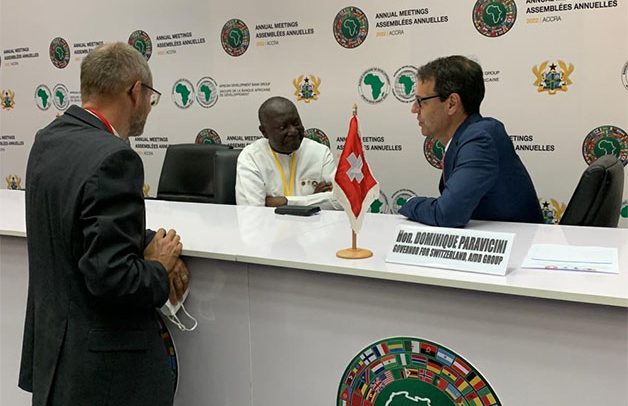Mr Ofori-Atta with Mr Dominique Paravicini, after the signing ceremony
The government and development partners including the African Development Bank (AfDB), Climate Investment Fund (CIF) and the Swiss Government Federation have signed a $69.88 million grant agreement to increase access to clean and reliable electricity services and low carbon socio-economic development.
The agreement which falls under the Scaling-up Renewable. Energy Programme (SREP) will see about 6,890 households, 6,001 Small and Medium-sized Enterprises (SMEs) and 6,890 public buildings connected to electricity.
About 1,350 schools and 500 health centres would also benefit from the project, which would include the design, engineering, supply, construction, installation, testing and commissioning of mini grids and standalone systems.
It is to also help reduce public sector electricity debt as well as bills for SMEs and households, while supporting the implementation of environmental, climate and social management plans of the country.
Minister of Finance Ken Ofori-Atta, signed the agreement with Dr Akinwumi Akin Adesina, President of the AfDB Group and Dominique Paravicini, AfDB’s Governor for Switzerland.
Mr Ofori-Atta, said the project: “Dovetails fittingly into an urgent global agenda and demonstrates our country’s commitment to enhance the economic and social viability of low carbon investments.
It is also in support of the country’s commitment to create new energy-efficient markets and stave-off a future energy crisis by achieving energy sufficiency.
On his part, Dr Adesina noted that the project would support Ghana in meeting its renewable energy requirement on the Sustainable Development Goal (SDG) and build a resilient economy.
“This project will increase access to clean and reliable electricity services and support low carbon socio- economic development of Ghana. It will directly support Ghana’s efforts in building resilience to socio-economic impact of the COVID-19 pandemic.”
Mr Paravicini, said that the signing of the agreement showed Switzerland’s continuous support to bring sustainable and affordable electricity to households and businesses.
SREP would be implemented between 2022 and 2025, under three components; the first would comprise of the development of 38 mini grids and standalone solar PV systems for 2,000 SMEs, 1,350 schools, 500 health centres, and 400 communities.
The second component, which is net metering, aims at up-scaling existing project to about 12,000 units of roof- mounted net-metered solar PV systems to reduce public sector electricity debt and bills for SMEs and households.
The final component would be the supervision of works including operating cost for SREP Project Implementation Unit, Distribution Utility, and the implementation of environmental, climate and social management plans.
By Jamila Akweley Okertchiri

